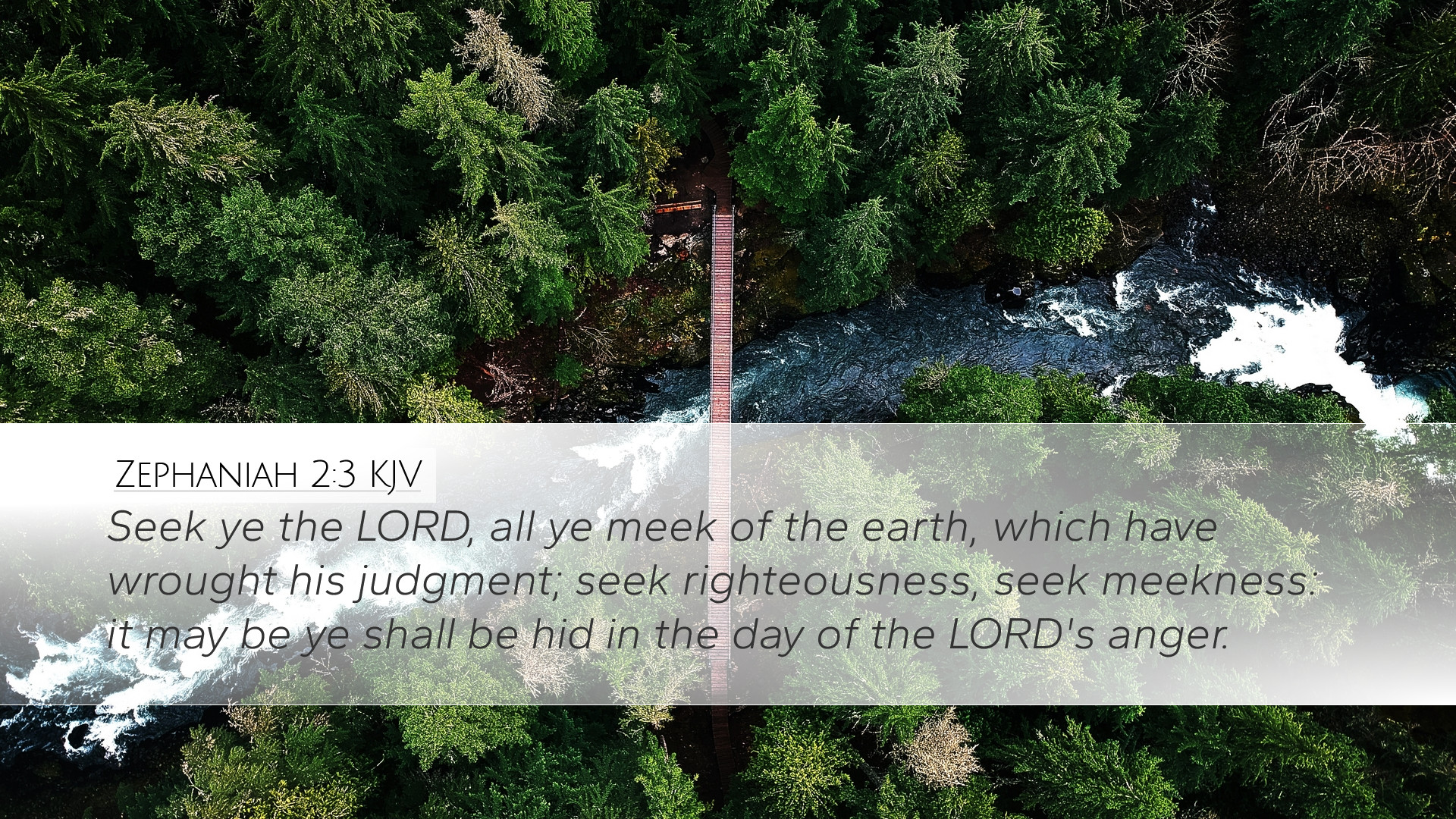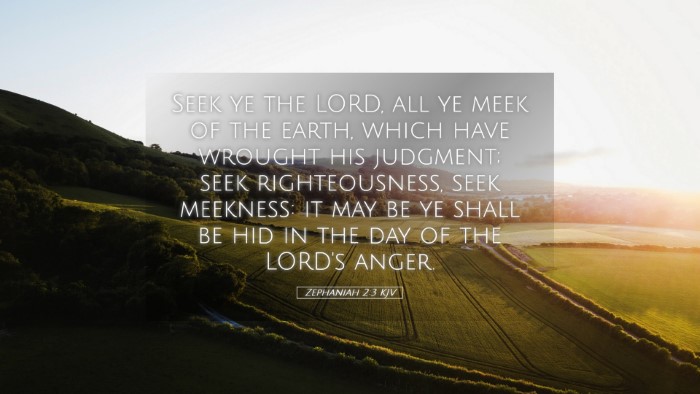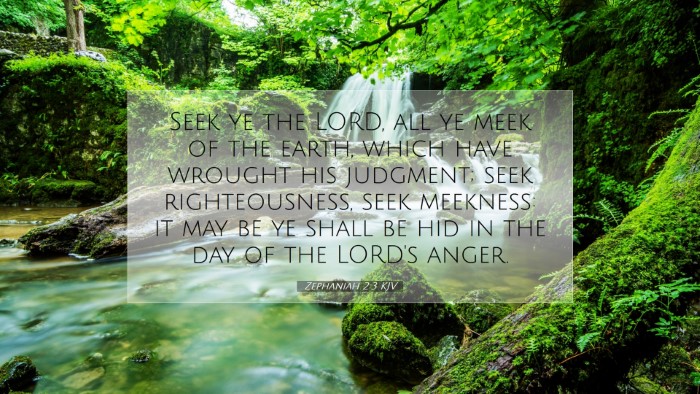Old Testament
Genesis Exodus Leviticus Numbers Deuteronomy Joshua Judges Ruth 1 Samuel 2 Samuel 1 Kings 2 Kings 1 Chronicles 2 Chronicles Ezra Nehemiah Esther Job Psalms Proverbs Ecclesiastes Song of Solomon Isaiah Jeremiah Lamentations Ezekiel Daniel Hosea Joel Amos Obadiah Jonah Micah Nahum Habakkuk Zephaniah Haggai Zechariah MalachiZephaniah 2:3
Zephaniah 2:3 KJV
Seek ye the LORD, all ye meek of the earth, which have wrought his judgment; seek righteousness, seek meekness: it may be ye shall be hid in the day of the LORD's anger.
Zephaniah 2:3 Bible Commentary
Commentary on Zephaniah 2:3
Zephaniah 2:3 states:
"Seek ye the LORD, all ye meek of the earth, which have wrought his judgment; seek righteousness, seek meekness: it may be ye shall be hid in the day of the LORD's anger."
Introduction
This verse encapsulates a significant call to the people of Judah, urging them to earnestly seek the Lord and to embrace righteousness and humility, particularly in light of the coming judgments. Zephaniah, a prophet during the reign of King Josiah, warns of impending divine wrath directed towards sin and idolatry while simultaneously offering a glimmer of hope to the faithful who heed the call to repentance.
Exegesis
The verse can be divided into key components that open up deeper theological implications:
- Seek Ye the LORD: This imperative emphasizes the necessity of an active pursuit of God. The call denotes an urgent and deliberate action, reflecting a relationship that must be nurtured through prayer, worship, and obedience as highlighted by Matthew Henry, who reminds the faithful of the importance of seeking God's presence.
- All Ye Meek of the Earth: The 'meek' signifies those who are humble and lowly in spirit. Albert Barnes notes that this stands in contrast to the proud and rebellious. This humility is not weakness but rather a recognition of one’s dependence on God. The meek are encouraged to turn to God, finding refuge in His grace rather than succumbing to the judgment that awaits the obstinate.
- Which Have Wrought His Judgment: This clause alludes to those who have acted faithfully according to God’s directives. Adam Clarke emphasizes that the 'meek' are those who have adhered to God's commandments even amid societal decline. This notion underlines the biblical principle found throughout scripture regarding the blessings promised to those who maintain righteousness.
Righteousness and Meekness
The dual call to seek righteousness and meekness provides insights for personal spiritual development and community ethics. Henry asserts that righteousness refers not only to personal integrity but also social justice. The call to meekness aligns with Jesus' teachings in the Beatitudes, where the meek are promised inheritance of the earth.
Spiritual Implications:
- Repentance: The invitation to seek righteousness implies a turning away from sin. Repentance is the prerequisite for divine mercy. As articulated by Barnes, the faithful must acknowledge their sins to walk in the paths of righteousness.
- Divine Protection: The verse concludes with a promise that those who earnestly seek the Lord may be 'hid in the day of the LORD's anger.' This suggests a divine shelter in times of crisis, akin to the Israelites' experience during the Passover, where obedience to God's command led to salvation from His judgment.
- Community Call: The collective invitation to the meek encourages unity among believers. Clarke emphasizes the need for the faithful to band together in a shared pursuit of God's mercy, fostering a community marked by humility and justice.
Theological Reflection
Zephaniah 2:3 resonates with themes of hope against despair. As the prophet delineates the harsh realities of God’s impending judgment caused by the people's sins, he simultaneously extends a lifeline to those willing to turn back. The intersection of justice and mercy stands at the heart of this passage.
Hope in Judgment:
The juxtaposition of impending judgment with the invitation to seek God captures the heart of biblical prophecy. Barnes notes that prophecies often serve a dual purpose: to warn of impending doom while simultaneously calling for redemption. The faithful response can mitigate judgment and lead to restoration, reinforcing the concept of God's unfailing love for His people even amid righteous anger.
Personal Application:
For contemporary believers, this verse challenges individuals and churches to evaluate their spiritual posture. Are they actively seeking the Lord with humility? Are they advocating for righteousness within their communities? The call to seek the Lord is timeless and applicable, encouraging believers to embody the meekness and righteousness that characterize a life devoted to God.
Conclusion
In summary, Zephaniah 2:3 serves as a poignant reminder of the importance of seeking the Lord through humility and righteousness. The insights provided through the combined commentary of Matthew Henry, Albert Barnes, and Adam Clarke reveal a rich tapestry of theological depth that informs our understanding of God’s character and His expectations for His people. In times of turmoil and strife, we are called not to despair but to seek refuge in the Lord whose mercy endures forever.


